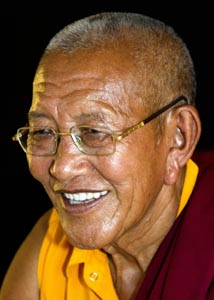Name: Tsultim Jungnay
(Alias: No)
Gender: Male
Interview Age: 76
Date of Birth: 1937
Birthplace: Zonga Tsang, Utsang, Tibet
Year Left Tibet: 1962
Profession: Farming
Monk/Nun: Currently
Political Prisoner: No

Interview No.: 12B
Date: 2013-12-24
Language: Tibetan
Location: Lugsung Samdupling Settlement, Bylakuppe, Karnataka, India
Categories: Buddhist Traditions
Keywords: Buddhist beliefs, childhood memories, farm life, monastic life, refugee in India -- life as, Utsang
Summary:
Tsultim Jungnay was born in Zonga Tsang in Utsang Province. He had a big family consisting of parents and nine siblings among whom he was the youngest. He tells that farming was the only source of livelihood for his family, which they had been doing for generations by growing grains, wheat and peas.
Hearing about the Chinese army's appearance in other regions of Tibet, Tsultim Jungnay fled to Nepal at the age of 19 without informing his parents. He worked as a transporter for two years and then moved to India. He shares his experience of working on road construction sites in Kulu Manali in northern India. He then recounts joining the Indian Army for 15 years and afterwards moved to the Tibetan settlement in Bhandara where many refugees died due to the intense heat Tsultim Jungnay married, had three children and cultivated the land given by the Indian government.
Tsultim Jungnay shares his story of how he embraced genchoe 'practicing dharma in senior years' upon the death of his wife. He describes in detail the merits of taking the vows of ordained monks and the various scriptures containing teachings of the Buddha and practices that are beneficial in this and the next life as well.
Interview Team:
- Marcella Adamski (Interviewer)
- Tenzin Yangchen (Interpreter)
- Pema Tashi (Videographer)

